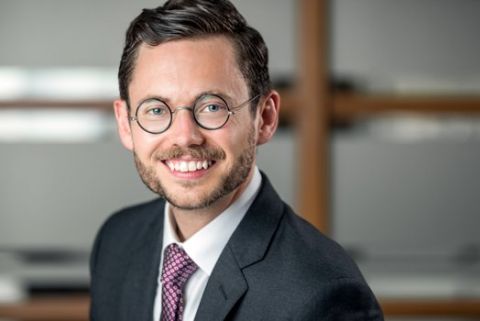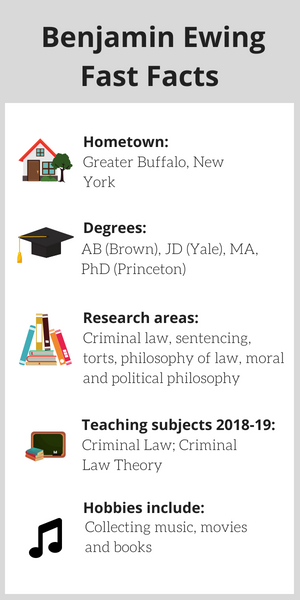
This Q&A is part of a series featuring faculty members joining Queen’s Law this summer. 2018 is a banner year for faculty hires, with the addition of seven new professors to the school’s roster of exceptional scholars. All of these new talented researchers have already earned international recognition in their fields.
Upon arriving in Kingston, Professor Benjamin Ewing spoke with Queen’s Law Reports to share his professional and personal interests.
Why did you decide to join Queen’s Law?
My interactions with members of the law school community convinced me that Queen’s Law is not only an excellent Faculty of Law but also a very collegial and supportive environment in which to learn, teach and write. Queen’s is also home to an unusually large number of distinguished scholars of legal and political philosophy. I look forward to participating in the Colloquium in Legal and Political Philosophy and to working with my new colleagues to solidify the status of Queen’s as one of the best places in the world to study law from a philosophical perspective.

What got you interested in your area of law?
My father is a forensic psychologist who taught criminal law at the University at Buffalo School of Law for over 30 years. Growing up, I would often discuss criminal justice with him at the dinner table. Some of the issues in which I am most interested – particularly the moral foundations of excuses and mitigating factors – are ones that he studied throughout his career, albeit through a psychological lens rather than a philosophical one.
Tell us about your research.
I have a longstanding interest in moral responsibility that undergirds my research agendas in criminal law and torts. In the area of criminal law, my present focus, I am especially interested in what it means to have a fair opportunity to avoid punishment – and the nature and role of a fair opportunity to avoid crime as a component of a fair opportunity to avoid punishment. I have used the framework of fair opportunity to avoid crime to develop theories of the mitigating force of a defendant’s unfairly disadvantaged background and the aggravating force of a defendant’s prior convictions. Going forward, I hope to develop a more general theory of fair opportunity to avoid crime and punishment and use it to shed light on issues of sentencing, substantive criminal law, and criminal procedure.
What are you most proud of?
I am very proud of my doctoral dissertation “Punishing Disadvantage: Culpability, Opportunity, and Responsibility.” In it, I argue that certain defendants have suffered unfairly criminogenic disadvantages. Because of their lack of what I call “fair ‘moral’ opportunity,” they have a claim of fairness to compensatory mitigation at sentencing, which I conceptualize as a form of “affirmative action” in criminal justice. I am still in the process of developing and extending many of the ideas in the dissertation, however. And I hope that the work of which I will be proudest lies ahead of me.
Any hobbies or interests?
I am an inveterate collector – mostly of music, movies and books.